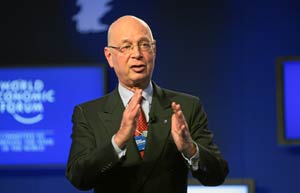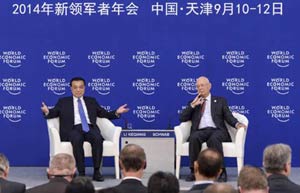As he prepared to join the 8th Annual Meeting of the New Champions in Tianjin, Klaus Kleinfeld, chairman and CEO of Alcoa, a global leader in lightweight metals technology, talked with China Daily reporter Du Juan about the latest developments in the industry and his advice on China's new growth model.
|
 Klaus Kleinfeld, chairman and CEO of Alcoa. CHINA DAILY
|
Alcoa is focusing on the strategy of building a lightweight multi-material innovation powerhouse and a globally competitive commodities business that drives shareholder value. We are transforming the company's portfolio by building our value-added businesses mid- and downstream to capture profitable growth.
We signed an agreement to acquire Firth Rixson - a global leader in aerospace jet engine components - last quarter, signaling acceleration in our transformation strategy. Once completed, the acquisition will enhance our position to capture global aerospace growth which in the second quarter we projected to grow at 8 to 9 percent.
We are increasing our ability to serve growing automotive demand for aluminum through our expansions in Iowa, in Tennessee, and at our rolling mill at the Ma'aden-Alcoa joint venture in Saudi Arabia. At the same time, we are also creating a lower-cost, globally competitive commodity business upstream. We have reduced high-cost operating smelting capacity by 1.2 million tons, or 28 percent, since 2007, and we are investing, as part of the joint venture in Saudi, in the world's lowest-cost aluminum smelter.
Alcoa is the largest multinational company in China's aluminum industry. What are the new opportunities in the Chinese market?
As China reforms, we see Alcoa as well positioned to capture growth opportunities in the mid- and downstream. Led by President Xi Jinping and Premier Li Keqiang, China is executing an impressive policy framework that is focused on building a consumer-led economy with a greater focus on environmental sustainability.
Alcoa produces multi-material products that will meet China's increasing demand for sustainable lightweight solutions in the growing aerospace, automotive, commercial transportation, consumer electronics, packaging, and industrial products markets. Our businesses in China supply these end markets, producing sheet and plate, brazing sheet, wheel products, and industrial and aerospace fastening systems.
For example, aluminum alloy sheet produced at our Bohai facility is used on the CRH380 electric high-speed train, the world's fastest. In 2012, Alcoa Wheel Products opened a new aluminum wheel production facility in Suzhou to capture downstream growth in China's commercial vehicle market. In the aerospace fastener market, our strategic and commercial agreement with the Commercial Aircraft Corp of China has served to reinforce Alcoa's presence in one of the world's fastest growing aerospace markets.
Alcoa's joint venture with China Power Investment offers us an excellent partner to expand our business and produce high-end fabricated aluminum products to meet China's growing demand. Alcoa also sees potential avenues to contribute to China's new quality growth model through its innovative wastewater treatment technology and ongoing research into scrubber technology that reduces industrial emissions.
President Barack Obama has made it a priority to make the US a leader in advanced manufacturing. What role is Alcoa playing in this effort? What advice would you share with Chinese businesses and policymakers as they seek to reform their manufacturing sector?
As a global leader in lightweight metals engineering and manufacturing, Alcoa has been asked to contribute its expertise to a critical public-private partnership effort on advanced manufacturing led by the White House.
Through my participation as a Steering Committee member of President Obama's Advanced Manufacturing Partnership 2.0, Alcoa worked to develop recommendations and a roadmap to accelerate advanced manufacturing policy in the US.
We worked to shape US national strategy for advanced manufacturing technology by identifying R&D priorities and cooperative models, suggested policy initiatives to improve the business climate for the manufacturing sector, and established a workforce development "Playbook," an employers' manual to build apprenticeship models.
Alcoa is also a founding member of the first US manufacturing institute focused on light metals - The National Lightweight and Modern Metals Innovation Institute - which was formally unveiled by Obama in February. It aims to expand the market for products using new lightweight metals and alloys by removing technological barriers.
Similar public-private partnerships in China would allow for multi-stakeholder collaboration on a diverse set of issues that would ultimately speed innovation to market and address issues facing advanced manufacturing in China.
 |
 |
|
|
|
